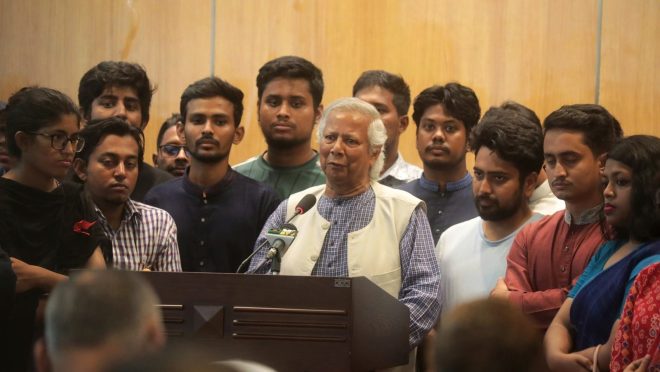How Professor Muhammad Yunus inspires today's young generation
How Professor Muhammad Yunus inspires today's young generation

With his innovative approach to social entrepreneurship, Dr Muhammad Yunus is a model of ethical leadership and has motivated a new generation of young people.
He is a ray of hope for the younger generation, inspiring them to see their potential as change agents through his unshakable dedication to social justice and creativity.
Honoured with a Nobel Prize, Dr Yunus is a testament to what can be accomplished with commitment, morality, and a strong faith in the ability of the young to create a better future.
Dr Yunus returned to Bangladesh to head an interim government after weeks of student-led protests forced Prime Minister Sheikh Hasina to resign and flee leading to the downfall of the Awami League government.
After reaching Dhaka from Paris he conveyed his sincere appreciation to the youth, saying, “I thank the young generation of our country for protecting and giving our country a rebirth. This is our second win, and we must hold onto our newly acquired freedom.” Their outstanding impact on the advancement of the country is further demonstrated by their recognition of their critical role in this revolutionary era. His positive words motivate the Youth of our nation to work for Bangladesh 2.0.
He also emphasised a sense of shared responsibility in his inspirational speech, saying, “The future of this country lies with the youth.” He asked the youth of the nation to rebuild the country in the way they see fit so that the rest of the world can take a cue from us and learn how to stand on one’s own two feet. This call to action is an invitation for Gen Z to transform the state system, creating a fearless atmosphere focused on empowerment and protection rather than just a request for help.
Beyond quick fixes, there are more changes in this leader’s plan. He stated, “Students can build the nation according to their vision since they have managed to gain independence.” The youth of Bengal will teach everyone on the planet how young people can reform a nation.
Young Bangladeshi residents are strongly encouraged to seize their opportunities and take on innovative leadership roles through this inspiring message.
It is evident how much of an influence Professor Yunus has had on the younger generation by getting them to rethink their place in society. Along with addressing fundamental issues of poverty and inequality, his groundbreaking work in microfinance and social business has instilled in young people a spirit of resilience and entrepreneurship.
Through promoting the idea of social business, a framework in which companies function to accomplish social objectives as opposed to just making money, Yunus has demonstrated to the youth how they may follow their passions and effect real change at the same time.
In addition, his dedication to social justice and moral leadership sets an example for the younger generation. Young visionaries who are eager to take on modern difficulties find great resonance in Yunus’s view that “social business can unleash the power of the youth and technology and solve the world’s problems much faster and also in a sustainable way.” His support of environmental stewardship and sustainable development inspires young people to act locally while thinking internationally.
The story of this nation is constantly changing, and Professor Yunus’s legacy is woven throughout. His belief in the youth’s ability to take initiative and create a future consistent with their ideals is evidence of his deep appreciation for their potential. Yunus’s comments serve as a ray of hope and inspiration for our country as it leads its revolutionary journey, pointing the younger generation in the direction of an innovative, inclusive, and resilient future.
Professional career
Professor Muhammad Yunus is a distinguished economist and social entrepreneur, best known for founding the Grameen Bank and pioneering the concept of microfinance. His career began as a lecturer in economics in Bangladesh, later progressing to various academic and governmental roles, including positions at Chittagong University and the Planning Commission of Bangladesh. In 1983, he established Grameen Bank, which revolutionized access to credit for the impoverished, particularly women, enabling them to start small businesses and improve their livelihoods. Yunus’s innovative work earned him the Nobel Peace Prize in 2006, recognizing his efforts to create economic and social development from below.
Throughout his career, Yunus has held numerous prestigious positions, including serving as the Managing Director of Grameen Bank until 2011 and currently as the Chairman of the Yunus Centre. He has been involved in various international advisory roles, contributing to global discussions on poverty alleviation, women’s empowerment, and sustainable development. His influence extends beyond banking; he has founded multiple social businesses and initiatives aimed at addressing social issues, such as Grameen Telecom and Grameen Shakti, which focus on telecommunications and renewable energy, respectively. Yunus’s work has not only transformed the lives of millions in Bangladesh but has also inspired similar microfinance initiatives worldwide, solidifying his legacy as a leader in social entrepreneurship and innovation.
All things considered, Professor Muhammad Yunus is a shining example of social innovation and visionary leadership. His impact goes well beyond his immediate accomplishments; it encourages a new generation of Bangladeshi youngsters to imagine and design a future that is consistent with their goals and aspirations. The legacy of Yunus provides them with direction and an endless supply of inspiration as they take on this enormous undertaking.


